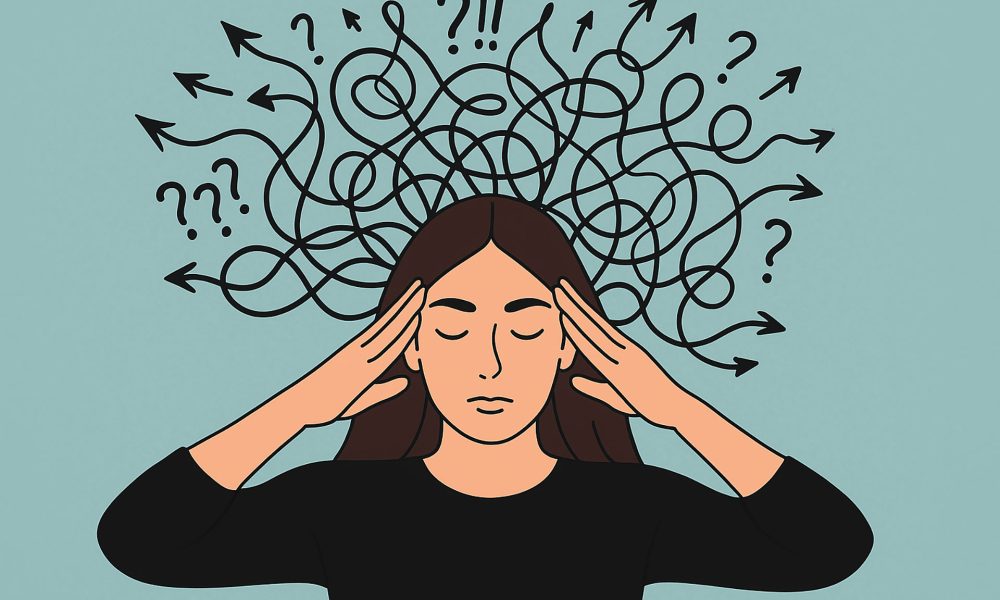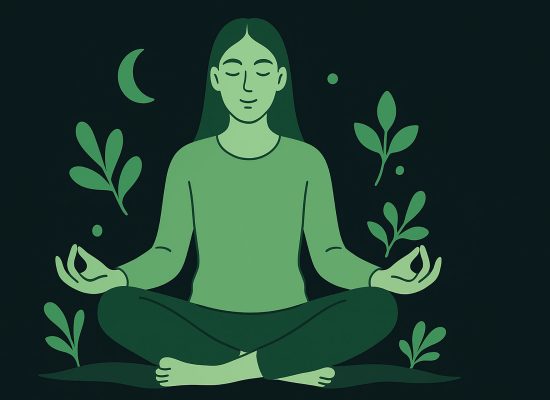Does any of this sound familiar?
You sit down for work but just… stare at the screen for a while, not sure which tab you’re supposed to be clicking on. Your to-do list feels like it’s constantly re-populating. Last night, you had to ask your partner to repeat something four times.
Table Of Content
You feel distracted, frustrated—like life is a treadmill you’re always one misstep away from flying off of.
This is how mental clutter feels when it builds up in your life.
The good news?
With a few basic changes to your day, you can find mental clarity—and start to feel like yourself again.
What Is Mental Clutter and Why Does It Happen?
Mental clutter refers to the buildup of thoughts, worries, and distractions that fill the mind and make it difficult to focus.
Some common sources of mental clutter include:
- Intrusive thoughts – Repetitive, irrelevant, or unsettling thoughts that interrupt your focus.
- Emotional buildup – Unprocessed stress from personal, work, or life challenges that demand your attention.
- Multitasking – Constantly switching tasks forces your brain to recalibrate, draining mental energy.
- Internalized expectations – Unrealistic standards and perfectionism that increase anxiety and self-criticism.
Mental clutter may start in your mind, but it doesn’t stay there. Over time, it affects your body too—tight shoulders, shallow breathing, mental fatigue. It can make you feel disconnected from your work, your relationships, and even yourself.
It might feel like the enemy of productivity, but It is really a signal. It shows you’re carrying too much without taking time to reset. That’s why learning how to clear your mind and declutter your mind regularly isn’t just helpful—it’s essential for staying grounded and focused in today’s world.

What Are the Signs of Mental Clutter?
Mental clutter can manifest in various ways, often disrupting daily life and overall well-being. Recognizing these signs is the first step toward achieving mental clarity.
- Persistent Overwhelm: Feeling constantly overwhelmed, even by minor tasks, can indicate an overloaded mind.
- Difficulty Concentrating: Struggling to focus on tasks or conversations is a common symptom of it.
- Forgetfulness: Frequently forgetting appointments, tasks, or important information may be a sign that your mind is overloaded.
- Procrastination: Delaying tasks or decisions can stem from an inability to process thoughts effectively.
- Sleep Disturbances: Trouble falling or staying asleep might be due to racing thoughts and an unsettled mind.
Identifying these signs allows you to implement strategies to declutter your mind, such as mindfulness practices, journaling, and setting clear priorities. By addressing mental clutter, you can enhance focus, reduce stress, and improve overall clarity.
How Can I Clear My Mind When It Feels Overloaded?
The best antidote to mental clutter and the overwhelm it causes is to take a break. Clarity doesn’t come from doing more—it comes from pausing with intention. These simple mental decluttering exercises give your mind room to breathe, helping you step away from the noise and reconnect with what matters.
Here are a few ways to create space and start clearing your mind:
- Clear-the-deck journaling (or a Brain Dump)– Writing your thoughts down (especially by hand) helps your brain let go of what it’s holding.
- Intentional breathing – Deep, slow breaths regulate your nervous system and bring you back to the present.
- Mindfulness and meditation – A practice like “Practicing Compassion When You’re Feeling Overwhelmed” in the Siddha Meditate app helps calm mental spirals and restore clarity.
Clearing your mind isn’t just important for productivity. Overwhelm can affect how you process emotions and make decisions. That’s why building a daily mental fitness practice—like those offered in our personalized challenges—is so valuable. Just like tidying your desk each day keeps it functional, regularly decluttering your mind helps you stay clear and grounded.
How Does Physical Clutter Affect Mental Clarity?
Physical clutter doesn’t just crowd your space—it can also cloud your mind. When your environment is filled with disorganized items, it can lead to increased stress and decreased focus. Studies have shown that cluttered spaces can elevate cortisol levels, the stress hormone, making it harder to concentrate and process information effectively.
Moreover, a cluttered environment can contribute to feelings of overwhelm and anxiety, as the constant visual reminders of disorganization can be mentally exhausting. This can impede your ability to think clearly and make decisions, ultimately affecting your overall well-being.
Decluttering your physical space is a practical step toward achieving mental clarity. By organizing your surroundings, you create a more serene environment that supports focus and reduces clutter. Incorporating regular decluttering sessions into your routine can be an effective mental decluttering exercise, helping you to clear your mind and enhance your mental clarity.

What Are the Best Ways to Declutter Your Mind Daily?
You don’t have to overhaul your life to experience more mental clarity.
By making mental fitness part of your daily rhythm, you can keep mental clutter from silently piling up.
Daily mental fitness practices are just as essential to your well-being as physical hygiene. Think of them as brushing your brain—small, consistent habits that keep your inner space clean and clear.
Incorporating practices like mindfulness, short-form meditation, and daily journaling helps you not only create clarity, but sustain it—even when life gets noisy.
You can also read “Mental Fitness 101: What It Is and How Meditation Builds a Stronger Mind“
How Can I Improve Mental Clarity Without Burning Out?
If you’re a high achiever, you might be tempted to go all in on a new routine—to sign up for a retreat or meditate for an hour a day. But consistency matters more than intensity.
Even five minutes of daily practice can help you feel calmer and more clear. Mental clarity is built gently, through repetition.
It’s also important to respect your energy and practice mental pacing: aligning your tasks with your current capacity, not your ideal schedule. Ask yourself: When does it feel natural to pause, write something down, or take a breath?

What’s the Difference Between Brain Fog and Mental Clutter?
Brain fog and mental clutter can feel similar—like you can’t think clearly or finish basic tasks. But they come from different sources and need different kinds of care.
Brain fog is often physiological. It can stem from lack of sleep, chronic illness, hormone fluctuations, or dehydration. You may feel sluggish, disconnected, or spaced out. If rest, water, or food help—it might be brain fog. If it’s persistent, it’s worth checking in with your doctor.
Mental clutter, on the other hand, comes from emotional and cognitive overload. It looks like overthinking everything, feeling irritable without reason, or jumping from task to task without completion.
Sometimes, it’s both. And that’s okay. Gentle attention in either direction can help you find your way back to yourself.
How Does Mindfulness Help Clear Mental Clutter?
Mindfulness isn’t a trend—it’s a powerful tool for creating space inside your mind. When mental clutter builds up, mindfulness acts as a pause button for your nervous system. It helps you shift from reacting to responding.
Neuroscience shows that mindfulness helps regulate the Default Mode Network (DMN)—the part of your brain involved in over-analysis and internal chatter. When your DMN is on overdrive, it can feel like your thoughts are spiraling. Mindfulness gently interrupts that loop, helping you return to the present.
You don’t need to meditate for an hour. Even short sessions—like those available in the Siddha Meditate app—can help you move through your day with more calm, clarity, and self-trust.

You Don’t Need a Total Life Makeover—Just a Gentle Reset
The same way your body benefits from movement and rest, your mind needs daily support to stay clear. For more guidance on managing stress and caring for your wellbeing, explore our Tending to Your Wellbeing collection for supportive, accessible practices. Mental fitness is built through small, repeatable practices that declutter your mind and strengthen your focus.
Siddha’s personal challenges help you seamlessly incorporate micro-habits into your life, making it easier to show up for yourself with consistency and compassion. Whether you’re trying to declutter your mind or looking for gentle ways to clear your mind after a long day, small steps add up.
Mental clarity isn’t about being perfectly Zen. It’s about having space in your head and heart for what really matters. Siddha Meditate offers guided meditation classes designed to support your mental health and productivity, making it easier to build a daily mental fitness routine with gentle, effective practices.
FAQs How to Clear the Mental Clutter
1- What are effective mental decluttering exercises?
Effective mental decluttering exercises include practices like journaling, where you perform a brain dump to transfer thoughts onto paper, and mindfulness meditation, which helps you observe thoughts without judgment.
2- How can I declutter my mind daily?
To declutter your mind daily, establish routines such as morning journaling, setting clear priorities, and taking short breaks for deep breathing. Consistent daily practices like these help maintain clarity and prevent the accumulation of mental clutter.
3- How do I clear my mind when overwhelmed?
When feeling overwhelmed, techniques like deep breathing, mindfulness meditation, and taking brief walks can be effective in clearing your mind. These methods help reduce stress and restore mental clarity, allowing you to refocus on the tasks at hand.
4- How does physical clutter affect mental clarity?
Physical clutter can significantly impact clarity by creating a distracting environment that hinders focus and increases stress. Organizing your physical space can help mind, leading to improved concentration and a sense of calm.







